
Son of tea workers, Mohan Rabidas is one of the organizers of Chandpur Begumkhan Tea Garden. He a Community Justice Fellow with Bangladesh Legal Aid and Services Trust (BLAST)
There are 1.5 million tea workers living in Bangladesh for 180 years. Inspite of that, they don’t have a right to their land. To speak candidly, they are alien in their own country.
Tea workers work from dawn to dusk for only 69 Taka (less than $1) which can’t meet their family expenses. Hence, they cultivate paddy as well as vegetables to earn a little extra money. As they don’t have documents or registration, their cultivable lands are being grabbed by the powerful classes. It’s a common phenomenon in the tea gardens of Bangladesh.
Bangladesh Economic Zones Authority (BEZA) has decided to establish an economic zone on 511.83 acres of arable land in Chandpur-Begumkhan area of Chunarughat Upazila of Habiganj District. The land belongs to 1250 families of tea workers. But it’s a matter of grief that BEZA didn’t even ask the workers about the project while compensation or rehabilitation is a far cry. So, the tea workers of the Chandpur-Begumkhan area are protesting against the decision of setting up “Special Economic Zone”.
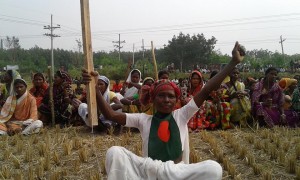
In a few countries including India, attempts to set up an “Special Economic Zone” has been questioned. It is not understandable why the authority has decided to destroy the arable land of the tea workers.
It is apparently clear that the authority has ignored the movements which have occurred all across Singur, Nandigram, Gurgaon, Mumbai, Goa, Maharastra, Odisha of India. In addition, movements in Bangladesh against airport project in Arial Beel and open coal extraction in Fulbari have not been taken into consideration.
BEZA may have thought that tea workers are feeble and not vigilant about their rights as they don’t raise their voice usually. Hence, BEZA chooses to make the first of its proposed 100 economic zones on the land of the tea workers.
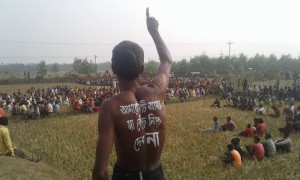
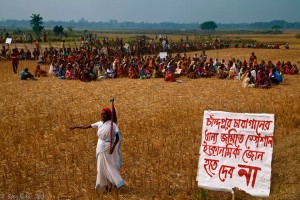
But tea workers have raised their voice . They are building resistance by accentuating the slogan “My land, my mother, you can’t take it” On the other hand, BEZA has marked them as “anti- development’. Does protesting against grabbing land and household illegally mean anti -development activities ?
Land Office of Chunarughat Upazila of Habiganj District has marked the agricultural land of the workers as non-agricultural and fallow in the record of rights. But the yearly production of paddy and other crops in this land are worth of 45 million Taka and 15 Million Taka respectively.
If an economic zone is set up by endangering the food security of the country, then it will only protect the interest of the investors. Besides, tea workers will be bereft of ripping the benefits of the project . It is pertinent here to mention that gas field at Rashidpur and stadium at Laccatura have been built on the land of the tea workers. It was promised that workers will get job at those newly established infrastructures. No workers got any job.
Setting up special economic zones will not create employment opportunities of employment for tea workers. They have understood it precisely. Factories have been established in Madhabpur, another upazila beside Chunarughat recently. But few people got employment. Moreover, people are being effected by the toxic waste of the factories . Plants, fishes and animal of that area have been destroyed to a great extent due to waste.
Again in India, “Special Economic Zone (SEZ)” was established in 12 states declaring that it will create employment for 3.9 million people. But in reality, only 284,000 employments were created. It is only 7% of the actual plan. Besides, workers could only work on the 9.6% of the SEZs which were based on manufacturing. On the other hand, whopping 56.64% SEZs were IT based. Since Bangladesh is following the same model, tea workers will get limited opportunity of employment in the SEZ.
In the laws of Bangladesh, these areas are called “Economic Zone”. But in reality, these are more like “Special economic Zone’’of India. In India, the law prescribes that in 50% of the acquired land, processing unit (Industry /Service) must be set up to create employment. But there is no mention regarding this in Bangladesh Economic Zone Act 2010.
Despite having these conditions, very few lands of India have been used in processing purposes. According to Comptroller General’s audit report, only 16.29% of the total 4185 hectors of land in 18 SEZs of 8 states were utilized for processing purpose.
Establishing economic zone in Chandpur-Begumkhan will adversely effect the environment of the concerned area. Tea industry and agriculture will face irreparable loss. Besides Satchari National Park, Raghunandon Forest, Rema-Kalenga Wildlife Sanctuary will be destroyed. In case of disposing industrial waste in the Sutang River, ponds and canals will be contaminated, thereby destroying aquatic ecosystems. We would like to remind that Sutang is an international and transboundary river. The hydrological number of this north-eastern river is 286. To protect rivers, Bangladesh Water Act 2013 has been adopted which prescribes for 5 years imprisonment and 10,000 Taka fine or both as a penalty for infringing any maintenance or protection order under the act.
According to section 4 of the draft of ‘Protection of Agricultural Land and Land Use and Related Laws 2013 and National River Protection Commission Act 2013, polluting rivers by industry, acquiring two/three crops land and grabbing river are punishable offense.
In October 2015, Honorable Prime Minister Sheikh Hasina told in the third meeting of the Bangladesh Economic Zone Authority (BEZA) that the government will allot land for industry by saving agricultural land too and we are doing this. (Source: ATN News, 22 October, 2015)
But from the above circumstances, it is clear that BEZA is breaching the laws of the country and Prime Minister’s declaration in this regard.
Tea workers are not against industrialization. They are protesting against destroying the agricultural and arable land. In Chunarughat Upazila, there are 122393 acres of cultivable, 4436 acres of government, 16544 acres of fallow land. So what is the necessity to destroy 511.83 acres of agricultural land of ours?
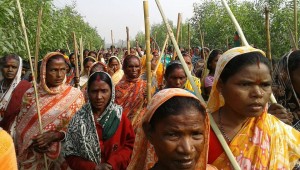
1.5 million people of 241 tea gardens of Bangladesh are protesting vigorously against the special economic zone in the agricultural land of Chandpur-Begumkhan tea garden. They are ready to sacrifice their life but they won’t let their land to be grabbed. Their slogan is “Take blood, take life, we won’t give agricultural land”.
Hence, it is high time to revoke this decision in no time to protect tea workers and ensure food and environmental safety.
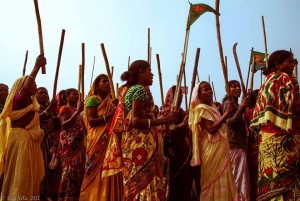
Mohan Rabidas obtained his Masters degree from University of Dhaka in Public Administration.
He was the former president of the University Tea Student Association (UTSA)




